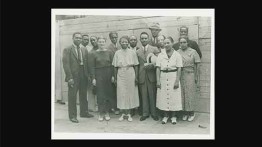The Cooper Union Augusta Savage Colloquium
Wednesday, May 5, 2021, 6:30 - 8:30pm

Harlem Community Art Center of the Works Progress Administration | Front row (left to right): Zell Ingram, Pemberton West, Augusta Savage, Robert Pious, Sarah West and Gwendolyn Bennett; back row (left to right): Elton Fax, Rex Goreleigh, Fred Perry, William Artis, Francisco Lord, Louise Jefferson and Norman Lewis. Photographer: Andrew Herman. Image credit: Schomburg Center for Research in Black Culture, Photographs and Prints Division, The New York Public Library.
The biennial Cooper Union Augusta Savage Colloquium is in honor of the life and work of the artist and educator Augusta Savage A'25. The conference aims to explore the intersections of history, art-praxis, education, and social justice by bringing various scholars and practitioners together for a public conversation. Organizers will also aim to work closely with current students to develop the program.
The Augusta Savage Colloquium invites an art historian or historian to present on a topic relative to the life and or legacy of Augusta Savage, directly or indirectly, an established artist or contemporary critic presenting original work on a similar or adjacent topic and an emerging BIPOC artist, art historian, architect or engineer addressing similar issues through their work and/or research.
The 2021 colloquium will include presentations from artist Lauren Halsey, art historian Howard Singerman, and the Benny Andrews Foundation.
Registration required for this online program.
Lauren Halsey is a contemporary American artist from Los, Angeles, California. Halsey uses architecture and installation art to demonstrate the realities of urban neighborhoods like South Central Los Angeles. In 2018 Halsey was involved in a solo exhibition at Foundation Louis Vuitton, Paris. She is the founder of SUMMAEVERYTHANG COMMUNITY CENTER, INC., a community center based in South Central Los Angeles dedicated to the empowerment and transcendence of black and brown folks socio-politically, economically, intellectually, and artistically.
Howard Singerman is the Phyllis and Joseph Caroff Chair of Art and Art History at Hunter College. He is the author of Art Subjects: Making Artists in the American University (1999); Art History, after Sherrie Levine (2012); and, most recently, Sharon Lockhart: Pine Flat (2019), a volume in the Afterall One Work series. He has contributed essays to numerous exhibition catalogues over the past four decades, among them A Forest of Signs (1989) and Public Offerings (1999), both at the Museum of Contemporary Art, Los Angeles, where he served as Museum Editor from 1985 to 1988. In 2020, Singerman was a Paul Mellon Visiting Fellow at the Center for Advanced Study in the Visual Arts at the National Gallery in Washington, D.C., where he continued the research he began with Acts of Art and Rebuttal in 1971, working toward a book tentatively entitled Black Artists in the New York Scene”: Acts of Art and Cinque galleries, 1969-1975.
The Andrews-Humphrey Family Foundation (AHFF) was established in 2005 by artists Benny Andrews and Nene Humphrey. The Foundation builds knowledge and fosters understanding around the life and work of Benny Andrews. It upholds Andrews’s commitment to education, social justice, and the project of creating a fuller, more accurate historical canon that acknowledges the contributions of women and people of color to the arts. The Foundation oversees the Benny Andrews Estate: the artists’ personal archive and an extensive collection of his artworks located in his former studio in Brooklyn, NY. The AHFF’s mission is to provide educational programming on Andrews’s life and work, including online resources, student outreach, access for academic researchers, and an artist fellowship through MacDowell.




